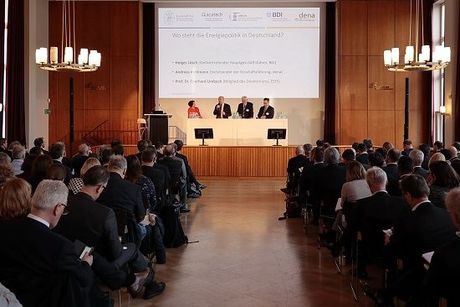It will be important to take action in all the relevant areas: renewable energy, flexible loads and controllable power plants, renewable synthetic energy sources, new transport technologies, energy-efficient buildings, prevention of industrial emissions and integrated management of the energy transition. For instance, ESYS, the BDI and dena estimate that it will be necessary to increase the annual net growth in renewable energy to at least six gigawatts, 50 percent more than envisaged in the 2017 Renewable Energy Sources Act. This renewable energy will also need to be integrated into the power grid, which will therefore require appropriate expansion and intelligent modification. The annual building retrofit rate will need to rise from the current figure of one percent to between at least 1.4 and 2.0 percent. Finally, in order to achieve ambitious climate targets for 2050, Germany will require renewable synthetic energy sources to deliver between 200 and 900 terawatt hours. By way of comparison, in 2017 Germany’s total primary energy consumption was approximately 3,800 terawatt hours.

Andreas Kuhlmann (dena), Eberhard Umbach (ESYS) and Holger Lösch (BDI) (left to right) present the study comparison’s key findings. © Pedro Becerra
Energy transition studies: now is the time to create a long-term framework and technology-neutral incentives
20. February 2019
A joint initiative of the German academies of science project “Energy Systems of the Future” (ESYS), the Federation of German Industries (BDI) and the German Energy Agency (dena) has formulated recommendations in seven action areas, aimed at helping Germany to successfully complete the energy transition and deliver its climate targets for 2050. Swift and decisive action by policymakers will be paramount – a comprehensive package of measures designed to stimulate large-scale investment should be introduced within the next few months. These were among the findings presented by ESYS, the BDI and dena at a joint event held in Berlin on Wednesday. The three organisations have each published their own policy study on the feasibility of the energy transition.
Contact Person
- Claire Stark
- Communications Officer
- Energy Systems of the Future
- Dr. Cyril Stephanos
- Head of Project Office
- Energy Systems of the Future
Delays in implementation will result in significantly higher costs and mean that the key technologies and infrastructure are not available soon enough. To prevent this, it will be necessary to adopt a holistic approach to the energy system, create a long-term framework, establish technology-neutral incentives, develop cross-sectoral instruments and provide opportunities for innovation and new business models. ESYS, the BDI and dena recommend a Federal Government review of the existing system of taxes, levies and reallocation charges during the lifetime of the current parliament in order to stimulate the necessary investment. The focus of this reform should be on CO2-based price signals for all sectors, including those not covered by the EU emissions trading scheme such as heating and transport. With the help of these measures, the energy transition and climate protection could become German industry’s most important strategic project.
In the words of ESYS, the BDI and dena
According to ESYS Board of Directors member Prof. Dr. Eberhard Umbach, “Rapid expansion of renewables is key to creating a climate-friendly energy system and making electricity our principal source of energy. To this end, the Federal Government must increase the target for net growth in wind and solar power systems to at least six gigawatts a year, while at the same time accelerating the expansion of the power grid. A variety of technologies that can deliver short-term flexibility will be required to compensate for fluctuations in renewable electricity generation – from electric car batteries and heat pumps to thermal storage systems, power-to-X and demand-side management. Nevertheless, the energy system of the future will still need reserve capacity. Flexibly activated gas-fired power plants and gas turbines will be necessary in order to guarantee supply in all weather conditions and at all times of year.”
In the words of Deputy Director General of the BDI, Holger Lösch, “Given the trillions of euros of additional investment that will be required to ensure successful and efficient climate protection, it will be crucial to develop solutions that are precisely tailored to the needs of the buildings, transport and industrial sectors. In the transport sector, industry and society will soon reach the limits of what is practically feasible. We will therefore need technology-neutral solutions if we wish to maintain individual mobility. Meanwhile, attractive tax incentives will be key to achieving the faster, more extensive and better energy-efficient retrofits that are required in the buildings sector. And industry must be supported in its efforts to find solutions for process emissions that are currently still unavoidable. New techniques will need to be ready for deployment by 2030. From today’s perspective, it seems likely that it will be necessary to employ Carbon Capture and Storage (CCS) alongside other solutions in order to deliver our ambitious climate targets.”
dena’s Chief Executive Andreas Kuhlmann concludes that “An integrated energy transition is possible. There is a clear sense that businesses and the wider public are ready to make the necessary changes. Policymakers can unleash a huge amount of momentum by making the appropriate modifications to the overall framework and realigning the system of taxes, levies and reallocation charges so that it is more effective at promoting climate protection, thereby allowing low-carbon technologies to compete on a level playing field. All three studies agree that it will also be necessary to establish a market for renewable synthetic energy sources both in Germany and globally. This will help to meet the emission reduction requirements that cannot be covered by energy efficiency measures and the direct use of electricity from renewable sources.”



